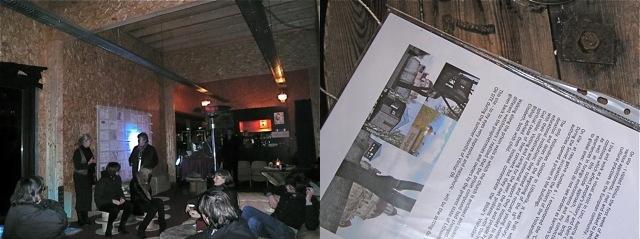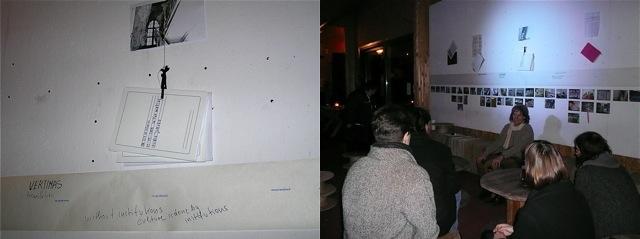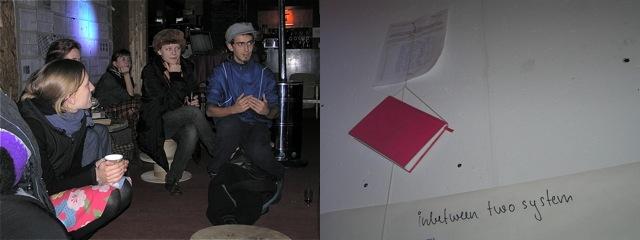Neris river, Vilnius: Kultflux container
Where do we go from here? project evaluation

When art escaped from the frame and descended into the real world, women artists were suddenly in their element.
As long as the work was open-ended, as long as life flowed through it, from its conception to its realisation, women could make it as well as anyone.
There's hardly any point now in asking if women have to be naked to make it into the Metropolitan Museum (as the Guerrilla Girls did), because the museum is not where it's at.
(...) Open-endedness characterises the work of women.
There are plenty of dyspeptic critics who see, in the fading away of the picture frame and the spilling of the artwork into real life, the end of art itself.
It seems more likely that art is being transformed from an antisocial preoccupation into something more conscious and committed.
In a threatened world, the eternal monument looks increasingly pathetic and ridiculous.
Germaine Greer
(Copyright Guardian Newspapers Limited 2009)
======
institution
why do we choose to create a company
why do we choose to work with an institution
when the social relations are being built again beside or outside the institution looking for new ways
==========
production /art & culture
How does the mutation/changes in political and social action, and the transformation of collective action can be perceived in the experiment of ONSITE?
The main influence is the individualisation, personification and privitisation of the actions. The project was constantly redirected towards the individual artist, and the collective work difficult to develop.
where do i get all this energy from this desire to develop some transparency to the situation we all face?
feminist economics
articulation of a new politics infused with an ethic of care, of concern, of connectedness, of community.
- Feminist economics cannot be separated from the feminist perspectives on the ethic of care.
application of the ethic of care in work situations (health, medicine, moral education and social work)
Why do I introduce the notion of care in the context of an art project ?
The issue of "mothering also intersects the issue of an ethic of care
ref:
The theories of Carol Gilligan (1977, 1982 and later)
(Florence Degavre - Le rôle des femmes dans le care et la reproduction du lien social, 2005)
Maria Mies & Vandana Shiva - Ecofeminism 1993
- Feminist economics cannot be separated from the feminist theories developped since the late 60s which can change the perspectives on the concept of development.
Women play a fondamental role in economic practices and behaviours which "count" for the existence of populations. But they are invisible and not included in the traditional approach of development, particularly in economics, based on "modernisation" and capitalist organisation. This approach, being in the South or in the North.
These practices contribute to reproduce social links and to reconstitute life territories. Including them to formulate new theories and concepts is essential to find solution to the ecological and social problems arising from "modernisation".
- Feminist economics cannot be separated from the feminist perspectives on the ethic of care.
An ethic of care and responsibility develops from an individual's feeling of interconnectedness with others. It is contextual and arises from experience. It is characterized by nurturance and an emphasis on responsibilities to others. An ethic of justice, on the other hand, is an expression of autonomy. It is formulated in terms of universal, abstract principles and is characterized by rationality and an emphasis on individual rights. Some describe an ethic of caring as a "female" approach to morality and an ethic of rights and justice as a "male" approach.
Dialogue around the issue has included agreement, refinements, further study, criticism, revision, and rejection. Some questions remain: "Can a care orientation be distinguished from a justice orientation? To what extent are either of these moral 'voices' related to gender? Can the ethic of care based on relatedness and responsiveness to others be considered a truly feminist ethic?" (Larrabee, 4).
see Germaine Greer
Les activités domestiques : un travail invisible et gratuit
Le travail domestique comme entrave à l?émancipation des femmes
Le « privé est politique »
besoin de securite et d'existence
par les deux bouts : celui des relations sociales et celui de l’économie, trop souvent opposées / le lien social se refonde à côté de l’institution, voire en dehors, cherchant de nouvelles voies.
le care, le don ou le service


